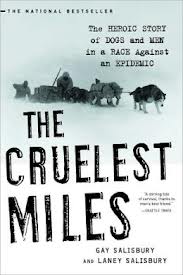
Looking for the perfect book to read on a cold, snowy, winter evening? You can’t do much better than The Cruelest Miles: The Heroic Story of Dogs and Men in a Race Against an Epidemic.
This is the amazing story of the first ever unofficial Iditarod dog sled race, run not for fame or fortune, but to save a small, isolated frontier town from being wiped out by disease.
“When a deadly diptheria epidemic swept through Nome, Alaska, in 1925, the local doctor knew that without a fresh batch of antitoxin, his patients would die,” reads the back of the book. “The life-saving serum was a thousand miles away, the port was icebound, and planes couldn’t fly in blizzard conditions – only dogs could make it. The heroic dash of dog teams across the Alaskan wilderness to Nome inspired the annual Iditarod Trail Sled Dog Race and immortalized Balto, the lead dog of the last team whose bronze statue still stands in New York City’s Central Park. This is the greatest dog story, never fully told until now.”
Co-authors (and cousins) Gay Salisbury and Laney Salisbury do an outstanding job of bringing to life the bleak prospects that faced this otherwise wild frontier town in 1925, and the crazy heroic efforts of the dogs and their mushers, to get the serum from Nenana (as far as the snow would allow transport by rail), up near Fairbanks, and then all the way across interior Alaska to the Seward Peninsula on the coast of the Bering Sea, and finally to Nome. The Cruelest Miles is a book I inevitably pick up every winter. Especially when it is storming.
Here’s a little taste:
“The gunslinger Wyatt Earp, a legend after his gunfight at the O.K. Corral, moved up to Nome and became co-owner of Dexter’s Saloon, the first two-story building in town … The western writer Rex Beach lived here and filled his notebooks with tales of Nome. His book The Spoilers, based on the story of a corrupt federal judge involved in a conspiracy to steal claims, became a best-seller. Tex Richard started his career staging boxing matches for Nome’s miners, then moved on to New York and built Madison Square Garden, becoming one of the first great sports impressarios.”
“His friends called [musher Leonhard Seppala] “Sepp,” a peppy moniker for the cheerful Norwegian immigrant. He was something of a show-off, known to flip double back handsprings just for laughs and land with a somersault. He would walk down Front Street on his hands, his back arched and his mukluk Eskimo boots brushing his tousled head, and the schoolchildren would laugh and clap their hands…
“On and off the trail, the dogs required constant attention, and Seppala poured time and money into his huskies. He had raised each of them from the time they were pups and he knew them as well as he knew his wife and child. He fed and cared for them and sometimes ate with them, tearing off hunks of dried salmon with his teeth.”
“Presumed dead, Togo [walked] into Nome more than a week after his teammates’ return, missing all the fuss over Balto crossing the finish line with the serum.”
“We are prisoners in a jail of ice and snow. The last boat may be justifiably considered to have gone and this little community is left to its own resources, alone with the storms, alone with the darkness and chill of the North.” – Nome Chronicle


